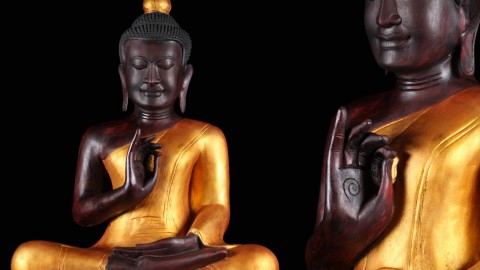Bertrand Russell has written that he knows that he is no longer a Christian, but somehow he goes on forgetting it again and again. The whole conditioning…. You may go against the tradition, but still you will cling to it. Even people who become revolutionaries remain attached to their traditions; maybe in a negative way. If a Hindu goes against Hinduism, he will still talk about Krishna – against him; he will still talk about Rama – against him. If a Mohammedan goes against his tradition, he will still be criticizing the Koran; of course criticizing now, criticizing Mohammed, but he remains attached to the tradition.
A real rebel is one who drops the tradition so deeply, so utterly, that he is not even against it. He is neither for nor against; then one is free. If you are against it, you are still not free. If you are against anything, you will find you are bound with that thing; there is a tie.
And habits become unconscious. I know a very, very learned man, very scholarly, very famous, and really a great intellectual. He has been a follower of J. Krishnamurti for long, almost forty years. And whenever he will come to see me, he will again and again say, “There is no meditation. What are you teaching to people? Krishnamurti says there is no meditation; all mantras are just repetitive; and all meditations, all methods, condition the mind. And I don’t meditate.”
I waited for a right moment to hammer the truth home. Then he fell ill, a heart attack. I rushed to see him, and he was repeating, “Ram, Ram, Ram….” I could not believe it. I shook his head and I said, “What are you doing? – Ram, Ram, Ram…. You are a follower of Krishnamurti. Have you forgotten?”
He said, “Forget all about that. I am dying. And who knows? Maybe Krishnamurti is wrong. And there is no loss in just repeating Ram, Ram, Ram; and it is very consoling.”
What happened to this man? Forty years of listening to Krishnamurti, but his Hindu is there. At the last moment the mind will start reacting. No, he is not a rebel. He was thinking, he is a rebel. He has been fighting everything, he has been against all that Hindus say, and in the last moment the whole edifice falls.
Life ordinarily is nothing but a habit, a mechanical habit. Unless you become aware, unless you become really aware, it will be difficult to get out of it.
I have heard about a gambler.
An inveterate gambler died, and his ghost wandered around disconsolately for several weeks. Although he was entitled to be admitted to heaven, he found himself bored by the place. No gambling, no gamblers – what is the use of going to paradise or heaven ?
Eventually he asked St. Peter if he could go and take a look at the other place.
“I’m afraid that is impossible,” said St. Peter. “If you go down there, you won’t be allowed back.”
“But I only want to have a look round,” said the gambler’s ghost.
So St. Peter agreed to issue him with a special pass allowing him to stay for just twenty hours.
Off went the gambler to have a look round hell, and the first thing he saw when he arrived was a group of old acquaintances playing poker. However, they refused to admit him into the game because he had no money.
“I will soon fix that,” he said, and off he went down one of the corridors. Ten minutes later he was back, flourishing a big roll of ten-pound notes.
“Where did you get all that money?” asked one of the others.
“I sold my pass,” replied the gambler.
Habits can be too much; you can even refuse heaven. In a fit of habit you are almost unconscious and helpless. That’s why the insistence of yoga is to bring more awareness to your ties. Remember as much as you can that you are not the body. And remember one thing more, that it is difficult to break a habit, but not difficult if you create another to substitute it. And that’s how it happens; people go on substituting habits. If you tell them, “You are not the body,” they will start thinking they are the mind. Then nothing changes, just the name of the habit changes.
This I see. If I tell somebody, “Stop smoking,” he starts chewing the pan. If I tell him to stop chewing the pan, he starts chewing gum. Or if you stop him from that too, he starts talking too much; that too is the same thing. In the beginning he was just smoking; at least he was harming only himself, nobody else. Now he cannot smoke, so he talks too much; now he is destroying others’ peace and silence also. A smoker is good in a way; he remains confined to himself. Women talk too much; once they start smoking, their talking becomes less.
In fact you must have observed: whenever you feel nervous, you start smoking. That smoking is just to escape from nervousness. And the same happens whenever you start talking. You are feeling nervous; you want to distract yourself with something.
I have heard a beautiful anecdote.
The patient, who was only eighteen, caused a lot of worry to his parents because he would spend hours in his room dressing himself very meticulously in his smart clothes.
He would take ages brushing his hair, polishing his shoes, then he would go into the kitchen, stick a carrot in his left ear and go dancing at a disco. Naturally his parents were worried about all this and they persuaded him to see a psychiatrist. He arrived at the psychiatrist’s office, beautifully groomed and wearing a stick of celery in his left ear. The doctor gently mentioned that his parents were a little worried about him and then he asked, “By the way, is there any reason for you to have a stick of celery protruding from your left ear?”
The boy looked surprised and said, “Of course there is. Mum did not have any carrots.”
Now if a carrot is dropped, then celery…. But people go on changing habits.
Sometimes it happens you can change a bad habit into a good habit, and everybody will be happy and everybody will be satisfied. But yoga will not be satisfied. You can stop smoking and you can start repeating a mantra. Now if you don’t repeat your mantra one day, you feel uneasiness in the same way as you used to feel when you were smoking and if you did not smoke for one day – the same desire to follow the routine, to do whatsoever you have been doing, mechanically. You can change a bad habit into a good habit, but the habit is still a habit. It may be good in the eyes of society, but for your inner growth it has no meaning.
All habits have to be dropped. I am not saying become a chaos. I am not saying live a life absolutely hectic and haphazard, zigzag, no. But let your life be decided by your awareness.
It is possible you can get up at five o’clock, early in the morning, as a habit; and it is also possible to get up early, five o’clock in the morning, not as a habit but as an awareness.
And both are so different, their quality is absolutely different. When a person rises at five o’clock just as a habit, then he is almost as mechanical as the other person who gets up at nine o’clock as a habit. Both are in the same boat. And the person who rises at five o’clock will be as dull as the person who rises at nine o’clock because the dullness is not a question of when you get up. The dullness is a question of whether you get up through habit or awareness.
If you get up through awareness, you will be alert. It may be nine o’clock in the morning, but if you get up through awareness, you will be sensitive, you will see things with a clarity, and everything will be beautiful. After a long rest, after all the senses have rested, they become alive again, more alive. The dust has disappeared; everything is more clear.
Rested, deep down into your para, your beyond, you had fallen in your sleep – all thoughts, body forgotten, left far away – you had moved to your home. You come back from there rejuvenated, fresh. But if it is just a habit, then it is as useless as any other habit.
Religion is not a question of habit. If you go to the church or to The temple just as a habit, a formality, a routine in which you have got into, you have been trained into, then it is useless. If you go to the temple alert, then the temple bells will have a totally different meaning for you, a different significance. Those temple bells will ring something within your heart. Then the silence of the church will surround you in a totally new way.
So remember, it is not a question of habit. Religion is not a question of practice. You have to understand, and this is how Patanjali has brought you, by and by, giving you more and more understanding, revealing to you more and more of the path.
The more you become clear, the more you can read the message written everywhere, on every leaf, on every flower. The message is God’s. His signatures are everywhere. You need not go into the Bhagavad Geeta, you need not go into the Bible and the Koran. The Koran and the Bhagavad Geeta and the Bible are written all over existence. You only need penetrating eyes.
I have heard:
A young married woman in London believed she was pregnant and went to the doctor to verify it. The doctor gave her a cursory examination and assured her that her suspicions were correct. Then, to her astonishment, he simply took a rubber stamp, printed something with it on her abdomen, and said, “That’s all.”
The wife related this strange event to her husband, and he asked, “What does it say?”
“Well, read it,” she replied.
He found that the print was too small for him to read, but a magnifying glass made everything clear. It read: “When you can read this without a magnifying glass, rush your wife to the hospital.”
Right now you need a magnifying glass – of a Buddha, of a Jesus, of a Krishna, of a Patanjali. And then too you cannot read because your eyes are almost blind. Once your eyes are clear, his message is everywhere. And so clear is the message that you will simply be surprised how you missed for so long, how you couldn’t see it. It was everywhere, all around; from every direction and dimension he was knocking at your door.
But if you live in the body, you will not hear it. If you live in the mind, you will hear it a little, but you will theorize about it and you will miss it. If you go deeper than the mind into pashyanti, where meditations lead you, you will be able to read the message and you will not become a victim of theorization, you will not philosophize. And once you don’t philosophize about it, once you don’t think about God but you see him and you don’t go around and around, about and about, and you penetrate directly; you disappear from pashyanti, the seed is broken. You fall into the abyss of para, the beyond.
The circle is complete: from silence to silence, from space to space, from God to God.
The beginning is God, the end is God. The alpha and omega – he is both.
Tags: Patanjali Real Rebel










